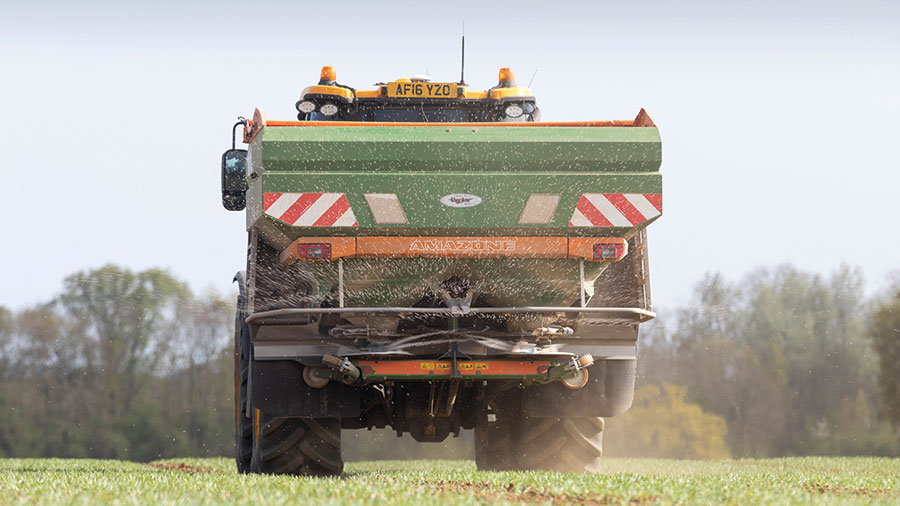Malting barley growers to take up fossil-free green fertilisers
 © Tim Scrivener
© Tim Scrivener About 20 growers in the north of England and Scotland will be growing spring malting barley and wheat for the distilling market using Yara’s fossil-free green fertilisers next spring, under contract with Simpsons Malt.
Yara has already taken steps to decarbonise the production of fertilisers, developing catalyst abatement technology that can reduce nitrous oxide emissions during production by up to 90%.
But those products still rely on natural gas as the raw material for the hydrogen, which is then mixed with nitrogen to produce ammonia via the Haber-Bosch process.
See also: Northants wheat grower cuts his nitrogen by using a drone
The ammonia is a key constituent of ammonium nitrate and other nitrogen-based fertiliser products.
Yara’s vice-president of green and low carbon fertiliser solutions, Birgitte Holte, explained to Farmers Weekly at the World Agri-Tech Innovation Summit in London how “green ammonia” is obtained.
Instead of using natural gas as the hydrogen source, it is obtained by electrolysis of water, essentially splitting water into oxygen and hydrogen using electricity produced from renewable energy sources.
“We then have an ammonia that is almost carbon and fossil-free,” she said.
“That will allow us to make a fertiliser that has an 80% lower carbon footprint than the nitrate fertilisers we produce today, in which we have already cut the footprint by half.”
Carbon footprint
It will reduce the carbon footprint of the production of 200kg N/ha typically used on wheat to just 0.1kg/ha of carbon dioxide equivalent (CO2e), compared with 0.7kg/ha of CO2e from the firm’s standard low-carbon fertilisers.
Fertiliser made without abatement technology produces 1.4kg CO2e/ha.
“That should cut the carbon footprint of a loaf of bread, for example, by as much as 15%,” Birgitte said.
“But it is just the fertiliser production element – the challenge remains for farmers to reduce emissions from fertiliser usage, which is also where Yara tools and knowledge can help.”
About 20,000t of green ammonia are being produced in an initial pilot, with the majority being used to produce about 50,000t of fertiliser.
However, there will be competition from other uses, such as the maritime sector to power “green” shipping.
A proportion of that fossil-free fertiliser will be used in the UK as part of a contract with Simpsons Malt and agri-tech startup Varda.
Malting barley
Simpsons Malt produces about 300,000t of malt annually at its two sites, and is aiming to achieve carbon-neutral malting barley and distilling wheat production by 2030.
Meanwhile, Varda has developed geospatial technology to enable integration of field level data.
“Around 20 growers will be involved in the first wave,” explains Mark Tucker, Yara’s sustainability and business solutions manager in the UK.
“We’re currently helping them determine their crop nutrition plans for next spring, but they will use a combination of green ammonium products and digital technology through the AtFarm platform to manage those crops, to improve nitrogen use efficiency while using low-carbon, fossil-free fertilisers.”
Mark said that exact contract details are still being finalised to ensure that the extra cost associated with these new solutions is shared equitably across the supply chain, and not falling at the farm gate.
Europe
Similar agreements are in place with German wheat farmers through millers Bindewald and Gutting Milling Group, and baker Harry-Brot.
They will use Yara green fertiliser on 1,600ha from 2024. An agreement in Sweden with agricultural co-operative Lantmannen is also aiming for the first fossil-free food chain.
Creating such partnerships are crucial, Birgitte said.
“We are totally aware that farmers cannot carry the extra cost of producing green fertiliser, which is why we are looking for value chains where the benefit from using green fertilisers is such that it makes business sense.
“For example, it could be where businesses take a higher market share with the final product, helps it obtain preferential financing, or achieve a higher price which isn’t scary for the end consumer to pay.”
She also expects the cost of green fertiliser production to reduce with scaling, while the price of carbon-intensive fertilisers will likely increase, at least in Europe through carbon taxation.

